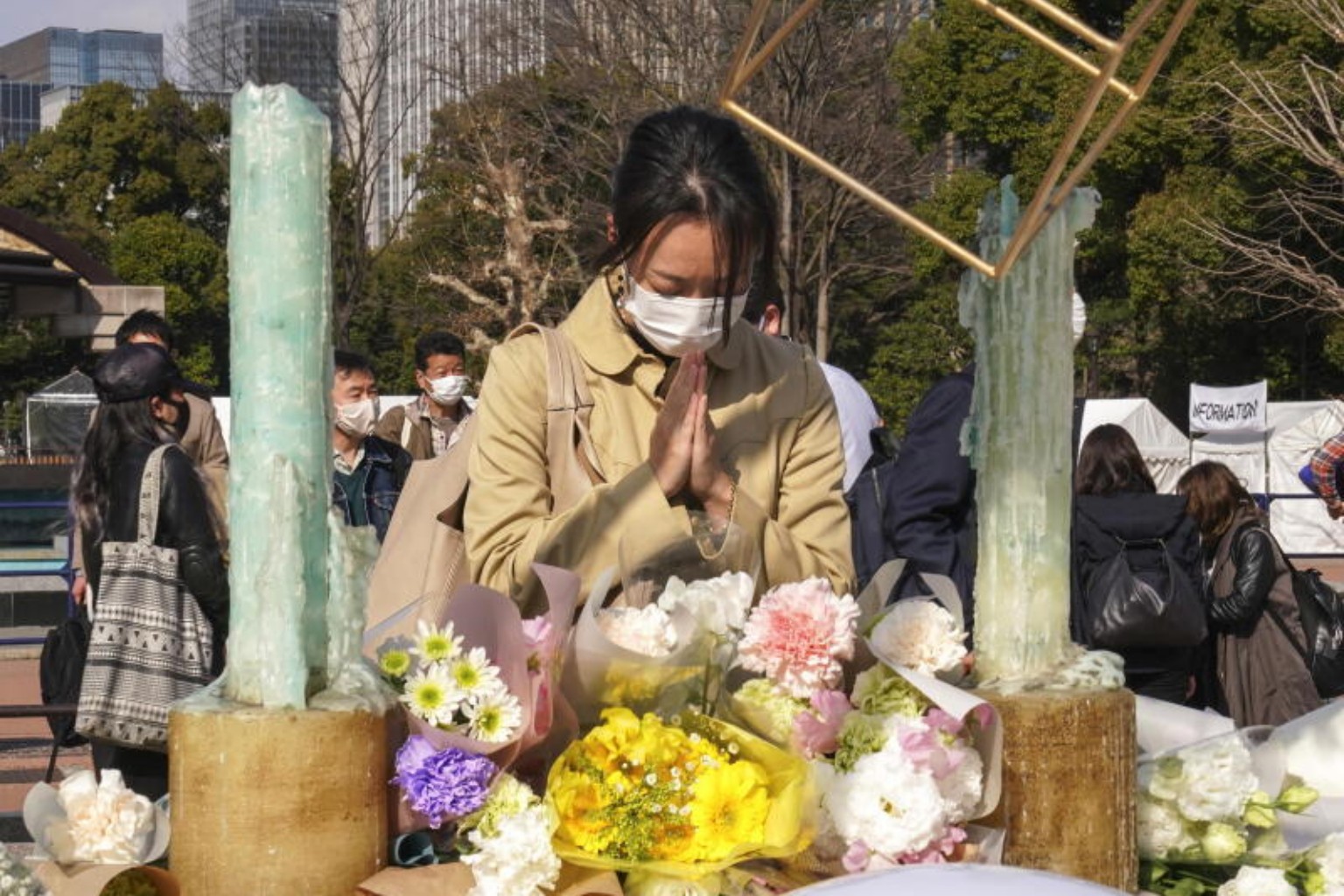As Tokyo moves on, many in Fukushima still suffering nuclear impact
Sign up now: Get ST's newsletters delivered to your inbox

A woman offers a prayer on the 11th anniversary of Japan's 2011 earthquake and tsunami, in Tokyo on March 11, 2022.
PHOTO: EPA-EFE
Follow topic:
TOKYO - A sign once stood proud and tall in downtown Futaba in Fukushima prefecture, bearing a slogan that read: "Nuclear energy will power a bright future!"
The sign, now taken down and on display at a memorial museum, is ironic insofar as how those directly affected by the nuclear disaster of March 11, 2011, continue to suffer the consequences.
Japan is now at a crossroads 11 years after the accident, as it hopes to put the disaster in the rear-view mirror and move on. There was no national memorial on Friday (March 11), with last year's 10th anniversary service the final of the annual ceremonies.
But evacuees have filed as many as 30 class action lawsuits before the courts in Japan where, for the first time, the Supreme Court issued a ruling this month.
It ordered Tokyo Electric Power Company (Tepco), the operator of the crippled Fukushima Daiichi nuclear plant, to pay about 1.4 billion yen (S$16.3 million) in damages to 3,700 evacuees who were forced out of their homes.
The top court will next decide if the national government should be held liable; a 2002 government report had highlighted the possibility of the nuclear plant being inundated by a tsunami but the risk had not been taken seriously.
In another David v Goliath case that is reverberating across Japan, six people who were aged between six and 16 in 2011 are now suing Tepco for damages amounting to 616 million yen after suffering from thyroid cancer.
None of the plaintiffs - now aged 17 to 27 - have any family history of thyroid cancer.
All of them have "had their lives ruined and dreams broken", lead attorney Kenichi Ido said. He hoped the case will inspire other cancer-afflicted youth to come forward.
Some 380,000 minors have been tested by Fukushima in the last 11 years, with 266 cases of thyroid cancer found, Mr Ido said, noting that this was a rare disease that only occurs in one or two people per million each year.
The case has hit a raw nerve.
Prime Minister Fumio Kishida accused former premiers turned prominent anti-nuclear lobbyists Junichiro Koizumi and Naoto Kan of "spreading fake news" after they cited as fact that "many children are suffering from thyroid cancer".
The government cites its own experts who say that the nuclear accident was unlikely to have caused cancer and Fukushima claims there is a possibility of "over-diagnosis".
But Mr Ido, citing his own medical experts, said the burden of proof should be on the government to conclusively show that his clients' illness had nothing to do with the disaster.
Yet this exemplifies the dilemma in the era of "fake news" and different versions of the perceived truth: many continue to feel troubled by the official narrative.
Fishermen are concerned that a plan - backed by Tokyo and the International Atomic Energy Agency - to release treated water from the crippled nuclear plant into the Pacific Ocean will upend their livelihoods given the damage to the reputation of regional catch.
The water would have been treated to remove all harmful radioactive contaminants before the discharge, save for tritium that is a routine byproduct of all nuclear power plants around the world.
The release, scheduled to begin in March next year, will be done about 1km offshore through a newly built undersea tunnel, with the "tritiated water" diluted over 100 times with seawater to make the level of tritium below 1/40 of the legal limit.
But a public relations offensive targeting children has spectacularly backfired, after the government sent 2.3 million booklets directly to elementary, junior and senior high schools for students.
Angry educators in coastal Fukushima, Miyagi and Iwate prefectures have complained about Tokyo "unilaterally imposing its views on children".
An elementary school principal in Miyagi told the Asahi Shimbun: "There are both arguments for and against the processed water discharge program, but the materials impose the thought that it is safe on naive children in a one-sided manner."
Mr Inokichi Shinjo, 70, the seventh-generation owner of Suehiro Sake Brewery that was founded in Fukushima in 1850, summed up the dilemma when he noted that objective facts can only go so far to allay subjective fears.
"I have learnt the clear difference between safety and security," he said of the main challenge he had in rebuilding his business.
"It does not matter how many times we declare that our products are safe if we fail to convey a sense of trust and security."

